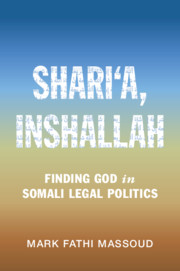'An invaluable, brave, and insightful contribution.'
Source: American Political Science Association Ralph J. Bunche Award Citation
'A powerful, important piece of scholarship [produced] through the expert use of multiple methods.'
Source: American Sociological Association Sociology of Religion Section Distinguished Book Award citation
‘A remarkable new take on legal pluralism [and] the limits of secularism … Highly recommended.’
R. A. Miller
Source: Choice
'Shari‘a, Inshallah takes Massoud’s pathbreaking scholarship on fragile states to a new frontier … A brilliant, superbly nuanced analysis of the integral role of religion in state-building, law-making, and social life.'
Terence C. Halliday - Research Professor, American Bar Foundation
'In Shari‘a Inshallah, Massoud examines Somalia’s political history through the lens of peacebuilding rather than state failure. The result is a bold and refreshing perspective on struggles over governance in Africa’s Horn that also offers an elegant reimagining of Islamic law’s role in the making of 21st century states.'
Susan Hirsch - Professor and Lynch Chair of Conflict Analysis and Anthropology, George Mason University
'A compassionate, timely, and hopeful study. The core message that ‘the problem is not shari‘a, it is what people have done with it’ presents an opportunity for Muslim-majority countries to reconcile faith, custom, and law.'
Jama Musse Jama - Director, Hargeysa Cultural Centre
'A comprehensively researched and fascinating legal ethnography. Massoud shows how Somali activists acclaim, yet strategically manipulate, shari‘a to link nation, state, human rights, and inter-clan unity - perhaps even more so than the judicial institutions favored by the Western aid community.'
David D. Laitin - Watkins Professor of Political Science, Stanford University
'Whatever you understand about shari‘a, this insightful book will challenge it. Massoud’s engaging narrative invites you to travel across places and times that deserve more attention. Your journey will end with new realizations about the rule of law, nation-building in Africa, and especially shari‘a.'
Asifa Quraishi-Landes - Professor of Law, University of Wisconsin, Madison
‘An exceptional and original piece of scholarship that rethinks the notion of an ‘Islamic state’ and the complicated intersections between law and rule of law in the constitution of political order.’
Source: International Studies Association Religion and International Affairs Book Award citation
‘… Massoud’s monograph is thoroughly documented, well researched, and effectively argued. It is an admirable addition to the literature that examines sharia. More accurately, this work is an analysis that examines the interaction of sharia and customary law in Somalia and Somaliland. It is not solely an examination of the role that sharia plays in creating ethical norms or judicial procedures. In some societies where clan affiliations permeate the society and are vibrant, it may be profitable to pursue Massoud’s line of inquiry, which is an examination of the interaction of Sharia and customary law rather than just an assessment of sharia.’
Ricardo René Larémont
Source: Law and Politics Book Review
‘An impassioned piece of advocacy for the value of shari‘a as a source of justice.’
Justin Willis
Source: The Conversation
‘A pioneering work that transforms the way we think about the interplay of law and religion in state-building.’
Nafay Choudhury
Source: Law and Society Review
‘Professor Massoud’s careful and sensitive understanding of a plural Islamic legal system and its confrontations with those who wanted to simplify, unify and dictate the law – be they armed warlords, ideologues or central government - helps to explain much that has been omitted from the analysis of Somalia’s recent history.’
Source: British-Kuwait Friendship Society Book Prize citation
‘Shari’a, Ishallah is a timely book that contributes to the analysis of law in an understudied context. Scholars of legal pluralism and Islamic law and politics will benefit from its empirical contributions to the study of religion and law.’
Source: Law and Social Inquiry





